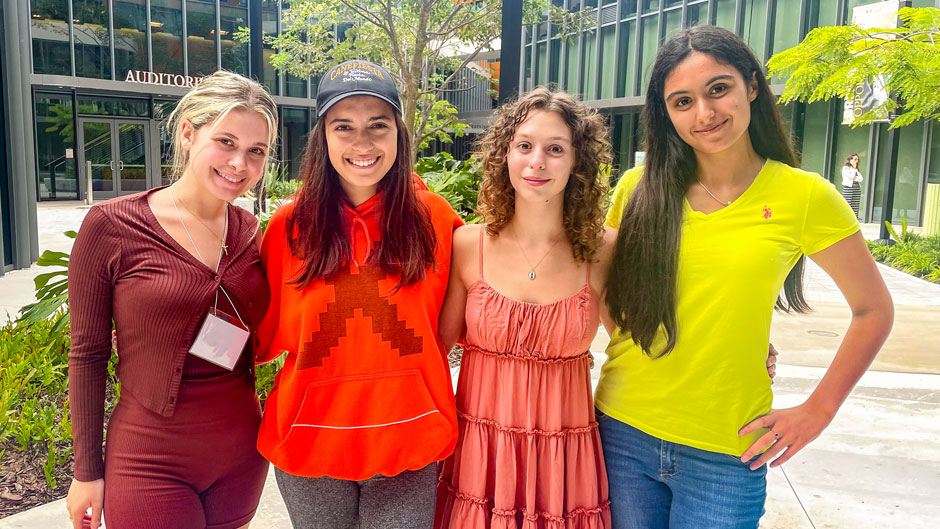Thousands of people are trafficked into the United States yearly, and the largest number of them come from Mexico. Many of these victims are lured into the country with the promise of a job but often end up trapped into forced labor.
Catherine Anillo, Michaela White, and Daphne Mall, all juniors at the University of Miami, have proposed to spend the next semester studying the factors that contribute to labor trafficking between the U.S. and Mexico.
They are part of a cohort of 25 students, with five from the University, chosen to participate in the Puentes Consortium Undergraduate Research Experience. The program brings together undergraduates from the University of Miami, Rice University, and three Mexican universities—Tecnológico de Monterrey, Universidad de Monterrey, and Universidad de las Américas, Puebla.
“The Mexican border is a chaotic region, and we hope to look into ways that illegal trafficking can be stopped and if not, at least mitigated,” said White.
The program introduces undergraduate students to interdisciplinary research and methodology, as well as connects them to top scholars who act as mentors, through the summer and the fall semester. The consortium’s main mission is to enhance academic connectivity and to address the most pressing issues affecting the U.S. and Mexico, said Ivonne Cruz, Puentes Consortium program administrator.
“We expose undergrads to serious research and plant a seed on how to do collaborative research at a very early stage,” said Cruz.
She added that the program expands on the knowledge the undergraduate students have on carrying out basic research by exposing them to scholars and experts in different disciplines they may not be familiar with, as well as teaching them how to approach and present a research topic.
Last week the students spent their time in virtual sessions learning about research methodology, data management, and qualitative methods. This week the students and their mentors are at the University listening to lectures from faculty members and other experts.
Dina Moulioukova, lecturer in international studies, faculty member in the Department of Geography and Sustainable Development, and co-founder of the International Interdisciplinary Security Symposium, is one of five mentors in the program. This is her second year in the role.
“I am passionate about this program because it is a cutting-edge program,” she said. “We usually don’t think of undergraduates when we think of research. But they are mavericks, and the research that undergraduates are carrying out nowadays is remarkable.”
The Puentes Consortium is unique for several reasons, she said. One factor is the interdisciplinary roster of faculty members that leads the students and teaches them different disciplines, she added.
On Monday, Moulioukova gave a lecture on international relations but also engaged the students in an interactive session where they had to use their team strategy skills to survive with others on the archipelago that emulated the system of international relations. “They were great,” she said.
The other two University participants in the program are Lillian Graul and Haley Gross. A sophomore at the University majoring in microbiology, Gross plans to do her research project on security between border towns in the U.S. and Mexico and how diseases are transferred. She wants to see how both countries can cooperate to minimize disease transmission. “I wanted to find a way to integrate what I am studying into the mission of the program,” she said.
During their time at the University, the students will learn from a host of professors. Sallie Hughes, professor and associate dean at the School of Communication, gave an overview of the plight of Mexican journalists during Tuesday’s session. And Ali Habashi, assistant professor in the Department of Cinematic Arts, spoke to them about the importance of imagery and connecting with the audience from a person-to-person approach.
Members of the U.S. Southern Command will also address the group this week. The students will engage in their projects during the fall semester and continue to work with their mentors. In addition, the five Miami students, will enroll in a class Moulioukova co-teaches with Habashi called “Global Issues and Filmmaking.”
The students’ final projects will result in deliverables, which could be published as white papers or in journals, according to Moulioukova. Their also might create a short documentary on their topics.
“This program gives them ownership of the process and gives them a voice,” Moulioukova said. “It makes their voices matter.”

